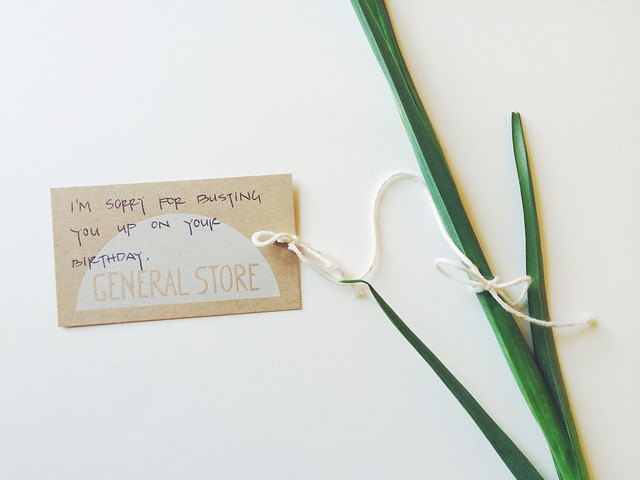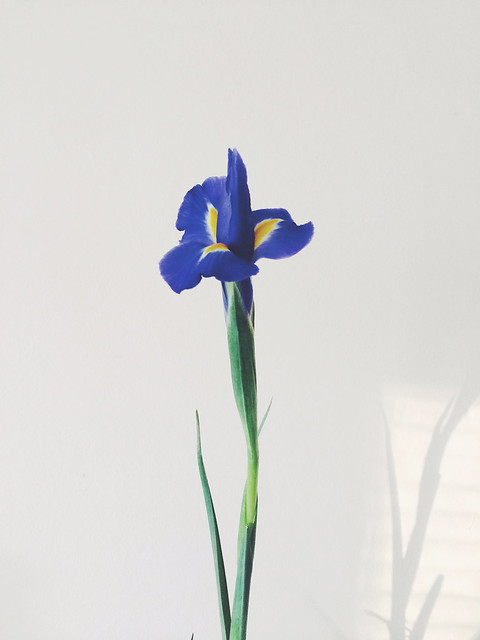"No one sees anything funny in a tree falling down. No one sees a delicate absurdity in a stone falling down. No man stop in the road and roars with laughter at the sight of snow coming down. The fall of roofs and high buildings is treated with some gravity. It is only when a man tumbles down that we laugh. Why do we laugh? Because it is a grave religious matter: it is the Fall of Man. Only man can be absurd: for only man can be dignified."
-G.K. Chesterton
I screamed, and then went completely silent.
Charley later told me that that the silence gave it away. Had I made a sound, the scream would have most likely been a joke, followed by laughter. But the scream itself was the eruption, or interruption, and nothing came after it.
In one swift second, my foot had gotten stuck between the car tire and the sidewalk: a total fluke of a moment, in which two forces pulled in separate directions, unknowingly. Luke was still operating a moving vehicle; I, unaware, tried to get out of the car. As I stepped out, my foot wedged itself, literally, between a rock and a hard place, he backed his car closer to the sidewalk, and the back tire dug further into my foot, squeezing it into a chokehold.
I screamed.
Charley ran around to the back of the car as I stared down at my foot, bewildered, shell-shocked, teeth sinking into lip, trying to swallow my tears, fearing that if I let out even one drop, my entire face would shatter, a bed sheet of ice floating precariously above black water.
I couldn't feel my foot anymore--how amazing our bodies are at blocking our suffering--and yet, the sudden, unexpected bolt of pain left me mute, dumb, and frozen.
Kneeling on the sidewalk, Charley gently took off my shoe, an Adidas high top with gold zippers, now scuffed. Luke hovered above, looking distressed, afraid, as anyone would be, of having injured a friend. Later, he recounted how terrified he was as Charley untied the shoe, hoping for something less than a post-traumatic monstrosity, a mere remnant of a foot, dangling phalanges.
Luckily, my foot was intact: a puffy and swollen heel and a tender ankle, but it still looked like a foot. It could have been a lot worse.
Luke apologized profusely, surely as shell-shocked as me, if not more--not by the bodily pain of physical injury, but by the affliction of guilt, which is a horrible injury one thrusts upon himself, like an explosive and grating act of self-mutilation. Like wishing that by rubbing salt into our own wounds, we’d heal the open wounds of those around us.
First stunned and helpless, then fumbling for words, Luke turned to the surest salve that he had, which was humor. I don't remember the jokes that he tried to crack. After all, it's not the jokes that matter, these incoherent words that tumbled out of our mouths as we were frantic, panicked, and unsettled. The jokes probably weren't even that funny, but we all tried to contort our mouths into smiles and laugh anyway, because it was the only relief that we could find at the moment.
I said I was okay, that I wanted to head into the party. I didn't want to sit here and try to figure out what to do with my ailing self. In pain, I wanted distraction. I wanted to move on immediately, escape the situation. This place we had descended into—this space of post-traumatic shock—felt like limbo.
Luke and Charley wouldn't let me walk, so they carried me to the party, my arms and legs split between the two of them like a great, big chair, hoisted in the air. I could only laugh at the absurdity of the situation, that on the evening of my twenty-third birthday, I was being paraded around like a helpless babe through these dark and quiet streets. Just ten minutes ago, we were driving up Divisadero listening to Zach Condon's travelling voice, which vibrated through the car, dark, somber, wistful, yearning and sweet--and now, now the vibrations had changed, and we were trying to make sense of this minor mishap. It was all going to be okay.
When we arrived at our friends' house for her holiday party, I stumbled in, trying to smile, trying to be okay. And yet, my body gave itself away.
"Natalie!" my friend Eileen exclaimed, greeting me by the door.
"H-h-hey," I stuttered back, my eyes glassy, glazed over. I had no words.
"Have you been drinking?" she asked, which I hadn't. I never do.
"No," I shot back, but that's all I could say, and when I couldn't manage another word, Eileen pulled me outside, and then into a bedroom, where I lay for the rest of the night, icing my foot, leg propped up on a pillow. I cried, convulsing, not out of sadness, not even out of pain, but because it felt most natural, as if the tears could excavate the shock and the absurdity of everything that had happened.
By the end of the night, Luke and Charley had found me and spent the rest of the evening by my side, trying to make me laugh, slinging jokes meekly at one another, trying to find a way to soothe the sores of this strange night.
"I'm sorry I messed you up on your birthday," Luke said to me at one point.
“Don’t feel bad,” I told him. “I’ll remember this birthday forever. And I’m pretty sure this is a bonding moment.”
Sometimes, trying to find the comedy in a mishap feels a little bit like picking up marbles with oil-slicked fingers, or trying to rescue trinkets and tchotchkes from swirling flames. Sometimes, it's a compulsion, like the mischief of scaring a flock of pigeons, or touching all the dusty surfaces of antique porcelains in a museum.
I remember one time in high school, I saw a classmate frantically weaving in and out of the hallway crowd trying to get to his next class, and as he was running, a classroom door abruptly opened and slammed him squarely in the face, banging his forehead so hard it rung, so hard that his glasses fell off. I saw this and burst out in cackling laughter, roaring at the top of my lungs, as if this were all slapstick comedy, which it may as well have been. Moments later, I was appalled at my own reaction, this sadist in me suddenly making itself known. Whether it was his haplessness or my helplessness, my first instinct was to laugh.
Mark Twain said, “The secret source of humor is not joy but sorrow.” Comedy arises out of our awareness that something is not as it should be. The injustice and sadness and brokenness around us demands that we respond with an awareness of those very incongruities, and that is what humor boils down to: interruptions, parodies, non-sequiturs, exaggerations, sarcasm—these are all ways of dealing with the incongruities in our lives. William Hazlitt says that we are the only creatures that can sense a real difference between the way things are and the way things should be, and that ability is both a blessing and a curse.
In Shakespearean tragedies, there is always a character whose role is to inject comic relief into the most somber scenes, when the rest of the characters are on the brink of tragedy. That is to say, levity can coexist with gravity—maybe it is even the way out of tragedy, a means of dealing, healing, and moving forward. Sometimes, in the wake of pain, our humor is morbid and inappropriate; sometimes it is a mere diversion; other times, it allows us to make hard-won connections with other people, or rationalize an unanticipated event, or find reason for a missed expectation, or vilify a scapegoat. Sometimes, it merely relieves tension; sometimes it eases the soul. It recognizes absurdity.
If we’re talking about tragedy, what happened on Sunday night was ultimately trivial. My foot is fine. In fact, what seemed like a small misfortune wasn’t really one after all. On the night of my twenty-third birthday, I lay in bed, surrounded by funny and loving friends, who tended to me by singing, telling jokes, and bandaging my foot. They missed out on a party to stay by my side. I was privy to the kind of categorical compassion, strength, and kindness that glamour and comfort often preclude. In a moment of collective weakness—and yes, I think all of us struggled a little—our skins were peeled back, and a new dimension of our selves became known to one another. It was that part of ourselves that we normally hide: the self in pain, the self in discomfort, anxiety, worry, or stress; the self we call ugly; the self we’re afraid of; the disoriented self; the confused self. We hope that when these parts of us creep out—because they were always there anyway—that our friends will still see us as whole, even though we’re fragmented, and yes, we really are.
“You saw me cry tonight,” I told Luke, after we left the party. “And that means we’re really friends now.”
I heard someone once say, that the courage to laugh is absolutely necessary to the pursuit of liberty—and oh, how difficult it can be, to laugh. To not take myself—or my misery—too seriously, for my own sake, mostly, if not for the sake of those around me. I’m writing this as a homily to myself: If I had to dig my own grave, I'd choose to laugh while digging, rather than cry, because either way, I’m heading in the same direction—only, I’d rather spend more of my life laughing than crying. Sometimes, making fun of my misery makes it just a little more bearable than wallowing in it.
And sometimes, when the people you love come along for the ride, and their laughter and light help you see outside yourself, farther beyond than you could on your own, you’ll find that what you thought was a tragedy may not have been so tragic after all.


0 comments:
Post a Comment